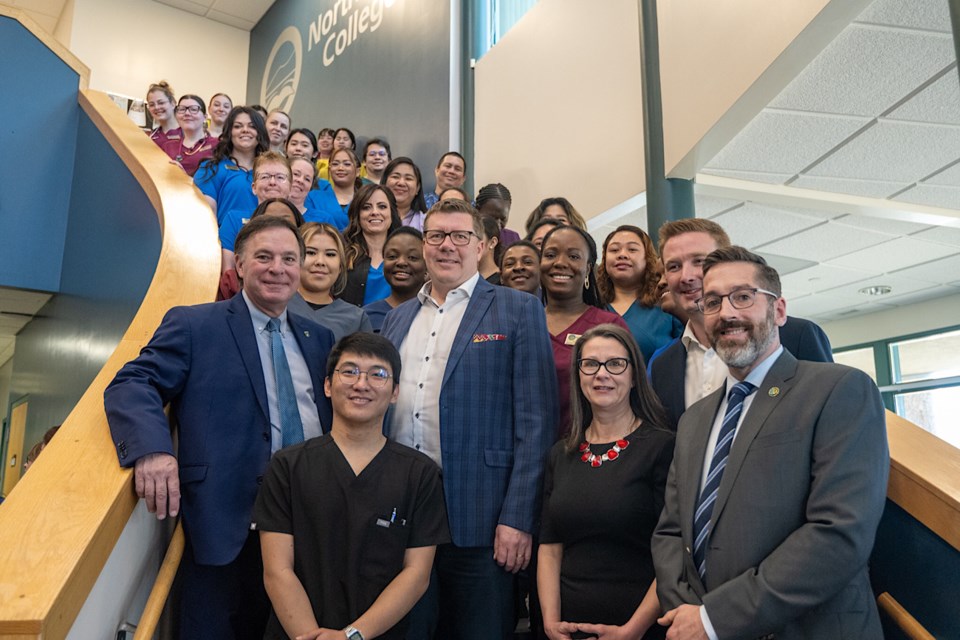NORTH BATTLEFORD - Premier Scott Moe and several members of his Cabinet were in the Battlefords Thursday for announcements aimed at addressing health care training seats and those with addictions issues in the court system.
The first announcement came at North West College where Moe, along with cabinet ministers including Minister of Education and Battlefords MLA Jeremy Cockrill and Minister of Advanced Education Gord Wyant, announced details of a $51.2 million investment towards expansion of health care training seats across the province.
Among the focuses is on nursing seats. In the Battlefords, officials touted the doubling of Registered Psychiatric Nurse seats to eight at North West College. That is part of a $4.9 million investment which includes 24 Registered Nurse seats through the Saskatchewan Collaborative Bachelor of Science in Nursing (SCBScN) program, jointly delivered by the University of Regina and Saskatchewan Polytechnic, as well as 16 Registered Psychiatric Nurse seats at Saskatchewan Polytechnic.
Moe said this investment was important with the hopes that at the completion of their training that those be able to stay at home whether they’re in the Battlefords or in a neighbouring community, or Indigenous community. "It is important for us to make sure that we’re training people, in particular in this case healthcare training seats, right across the province not only in the two largest cities,” Moe said.
“What this is part of this part of our four-point plan, the most ambitious program in all of Canada, to recruit health human resource professionals into our communities and into our healthcare system. This is part of a $111 million investment which includes 18 medical professional disciplines… and about 870 various training seats that are being added to the training seats that we already have in our post-secondary institutes whether they be our universities our Sask Polytechnic or this case our regional colleges which have a reach right into most rural and remote areas.”
In a news release, the province pointed to over $111.5 million to expand health training programs as part of the Health Human Resources Action Plan, with approximately 870 new health care training seats being implemented for Saskatchewan students. Over 250 in nursing programs are for Saskatchewan students.
"Expanding nursing education seats not only enriches the educational journey of aspiring nurses by granting them access to top-notch instruction but also serves as a proactive response to the growing demand for skilled health care professionals," North West College President and CEO Dr. Eli Ahlquist said in a news release. "By creating new opportunities in health care education, particularly within Saskatchewan, we guarantee that local students are equipped with the means to pursue rewarding careers within their own communities."
The new Registered Nursing and Registered Psychiatric Nursing seats will be available for students starts this fall, 2024.
The other announcement came a little later in the day at the North Battleford Provincial Court which is seeing expansion of the Drug Treatment Court program to North Battleford.
There are currently two Drug Treatment Court programs in Saskatchewan; the Regina Drug Treatment Court established in 2006 and Moose Jaw Drug Treatment Court opened in 2009. Both have seen over 140 graduates complete the program.
“The reason for the expansion is because of the successes we are seeing,” Premier Moe said. He said about a third of those who have entered the program do graduate, a strong number.
Drug Treatment Court provides an alternative-based approach to sentencing. Instead of going straight to jail, offenders experiencing an addiction and facing drug or other charges are able to enter a program that includes class time and addiction treatment and compliance.
To complete the program they must do over 200 hours of class time and meet requirements including a minimum of three months without drugs, six months without committing a crime, and a long-term recovery plan. There are regular screenings and counselling as well
Their progress is tracked and once participants have met all conditions for graduation, they are sentenced on the charges that they originally pleaded guilty to when they entered the program.
The goal at the end of it is for those who complete the program to come out of it clean and break the cycle of addiction. There is also a family reunification component as well.
Premier Moe as well as Minister Cockrill and Minister of Justice and Attorney General Bronwyn Eyre were among those at the announcement. Eyre told reporters the court was “a necessary component, and necessary, wraparound to rehabilitation and to offenders who are facing addiction, but want a way out of their addiction, want support for rehabilitation.”
This investment is part of the $574 million in funding to mental health and addiction services in the 2024-25 budget. Saskatchewan Drug Treatment Courts are getting $1.7 million in funding, with $240,000 going to the expansion to North Battleford. The new North Battleford court will start operation later this fall.






